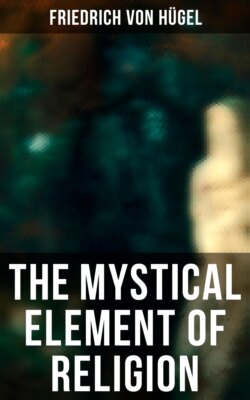Читать книгу The Mystical Element of Religion - Friedrich von Hügel - Страница 32
На сайте Литреса книга снята с продажи.
3. Place and function of such science in the totality of man’s life.
ОглавлениеThe mistake in the past would thus lie, not in the doctrine that the Visible cannot suffice for man and is not his mind’s true home; nor in the implication that the Visible cannot directly and of itself reveal to him the Spiritual world. The error would lie entirely in the double implication or doctrine, that there is really nothing to be known about Nature, or that what can be known of it can be attained by Metaphysical or Mystical methods; and again that strictly quantitative, severe scientific method and investigation can, even in the long run, be safely neglected by the human soul, as far as its own spiritual health is concerned.
We take it then that mankind has, after endless testings and experiences, reached the following conclusions. We encounter everywhere, both within us and without, both in the physical and mental world, in the first instance, a whole network of phenomena; and these phenomena are everywhere found to fall under certain laws, and to be penetrable by certain methods of research, these laws and methods varying indeed in character and definiteness according to the subject-matter to which they apply, but in each case affording to man simply indefinite scope for discovery without, and for self-discipline within.
And all this preliminary work and knowledge does not directly require religion nor does it directly lead to it; indeed we shall spoil both the knowledge itself, and its effect upon our souls and upon religion, if religion is here directly introduced. The phenomena of Astronomy and Geology, of Botany and Zoology, of human Physiology and Psychology, of Philology and History are and ought to be, in the first instance, the same for all men, whether the said men do or do not eventually give them a raison d’être and formal rational interest by discovering the metaphysical and religious convictions and conclusions which underlie and alone give true unity to them and furnish a living link between the mind observing and the things observed. Various as are these phenomena, according to the department of human knowledge to which they severally belong, yet they each and all have to be, in the first instance, discovered and treated according to principles and methods immanent and special to that department.
And the more rigorously this is accomplished, both by carrying out these principles and methods to their fullest extent, and by conscientiously respecting their limits of applicability and their precise degree of truth and of range in the larger scheme of human activity and conviction, the more will such science achieve three deeply ethical, spiritually helpful results.
Such science will help to discipline, humble, purify the natural eagerness and wilfulness, the cruder forms of anthropomorphism, of the human mind and heart. This turning to the visible will thus largely take the place of that former turning away from it; for only since the Visible has been taken to represent laws, and, provisionally at least, rigorously mechanical laws characteristic of itself, can it be thus looked upon as a means of spiritual purification.
Such science again will help to stimulate those other, deeper activities of human nature, which have made possible, and have all along preceded and accompanied, these more superficial ones; and this, although such science will doubtless tend to do the very opposite, if the whole nature be allowed to become exclusively engrossed in this one phenomenal direction. Still it remains true that perhaps never has man turned to the living God more happily and humbly, than when coming straight away from such rigorous, disinterested phenomenal analysis, as long as such analysis is felt to be both other than, and preliminary and secondary to, the deepest depths of the soul’s life and of all ultimate Reality.
And finally, such science will correspondingly help to give depth and mystery, drama and pathos, a rich spirituality, to the whole experience and conception of the soul and of life, of the world and of God. Instead of a more or less abstract picture, where all is much on the same plane, where all is either fixed and frozen, or all is in a state of feverish flux, we get an outlook, with foreground, middle distances, and background, each contrasting with, each partially obscuring, partially revealing, the other; but each doing so, with any freshness and fulness, only in and through the strongly willing, the fully active and gladly suffering, the praying, aspiring, and energizing spiritual Personality, which thus both gives and gets its own true self ever more entirely and more deeply.
